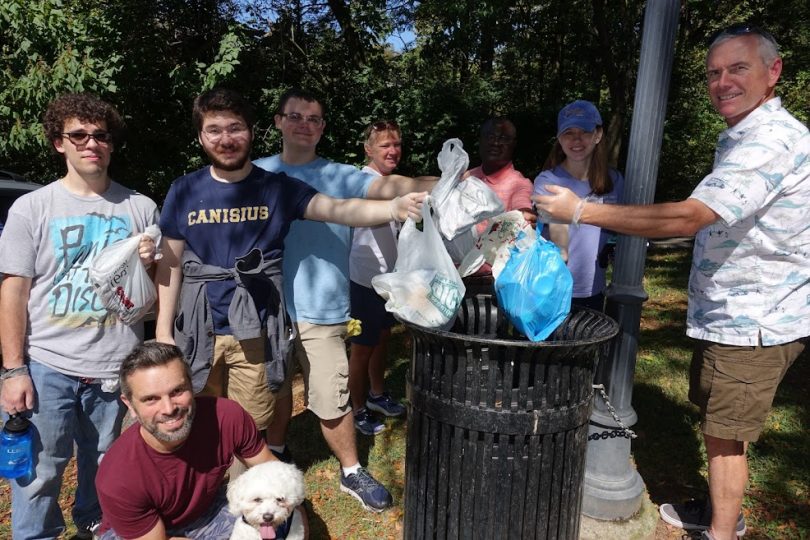(Members of the Edgeboro Moravian Church
keeping their neighborhood clean)
Time for some Lenten Cleaning
By Bishop Chris Giesler
Preaching Text: John 2:13-22
You get’em, Jesus! You go get those money changers. Those souvenir sellers. Those sacrificial cattle dealers. You get ‘em, Jesus!
This is a story about Jesus and his holy anger. This is a story about Jesus storming around the temple grounds, turning over tables, and confronting the sellers and the money changers who were getting in the way of people having a place to pray. You get ‘em, Jesus! After all, these were people who needed to be straightened out.
Now, before we dig a bit more into this text, just a word about why we find this story here in John’s Gospel and not near the end of the book as it is situated in Matthew, Mark, and Luke. Each of them has this event happening right after Jesus’ triumphant entry into Jerusalem, which we celebrate as Palm Sunday. But here, John places the story in the second chapter right after Jesus’ first miracle at the wedding in Cana. John didn’t care about telling the story of Jesus’ life in chronological order. So, at the beginning of the Gospel, John is telling us that Jesus’ priority is about a relationship with God, not making money in the Temple. John also wants to let us know that Jesus is not afraid to make his case.
As John’s narrative unfolds, we are told that the Passover celebration is near, and Jesus has made his way to Jerusalem and, more importantly, to the Temple. The Temple was built upon the very rock where Abraham had begun the process of sacrificing his son before God told him to use the ram instead. This was sacred, holy ground. The Temple was the place of worship that housed the Tabernacle, which had held the tablets of the Ten Commandments. This was Holy Ground. It symbolized the very presence of God amid the people.
King David had planned the first temple on this site, which King Solomon then built. This was the Temple destroyed by the Babylonians and rebuilt after the return of the exiles, as recorded in Ezra and Nehemiah. It was all but destroyed again by the Hasmonians but rebuilt by Judas Maccabeus, who rededicated the Temple by lighting a ceremonial lamp with only a day’s worth of oil. Miraculously, it remained lit for eight days, giving them time to make more oil. This, of course, is what the celebration of Hanukkah is all about. This temple was on sacred ground.
This was the temple that Herod the Great decided to rebuild to its original glory. Begun some 20 years before Jesus was born, it was still not yet completed. It was a massive building, easily the most impressive architectural structure in the entire country.
At the Temple’s core was the Holy of Hollies—where only the chief priest could enter once a year. Then, there was a court for only the religious elite. Then, a prayer place for all Jewish men, a place of prayer for women and children, and then the Court of Gentiles for foreigners.
All devoted Jews hoped to make it to the Temple to celebrate the Passover, the salvation event for the Jewish people. And you can believe that at Passover, Jerusalem was a bustling place with thousands of pilgrims from all over the known world coming to remember God’s act of deliverance. And this is where we find Jesus on the year’s highest holy celebration.
So, we say, “You go get ‘em, Jesus. Give ‘em the what for. Turn over those money-changing tables, drive out the cattle and sheep, and set free the caged doves. You set ‘em straight. How dare they desecrate this holy ground!”
Over many years, the Temple leaders had struck on a financial boon. First, convince people they need to provide sacrificial animals for the forgiveness of sins. Next, get into the business of selling those required sacrificial animals, big and small. Finally, they set up money-changing tables so folks could exchange their Roman currency for the local Temple money. This exchange came with a fee, of course. So, every year at Passover, the prayer place for Gentiles was taken over to give room for this money-making operation. And Jesus was not happy about it. He lost his patience and took matters into his own hands without concern for his own safety.
But if we leave this act of rage as something directed from Jesus just to the Temple leaders of his day, we have missed the Lenten invitation to search our hearts. For us today, Jesus isn’t cleaning a temple that has long since been torn down. Jesus isn’t driving out distractions to prayer that were present 2,000 years ago; he’s talking to us today. But you see, as long as we have evil to be worried about out there, we don’t have time to worry about the distractions that are right here inside of us. If we can concern ourselves with somebody else’s shortcomings, we don’t have to worry about our own sins. It is much easier for us to say, “Jesus, go straighten them out,” than pray, “Jesus, come and search my heart.”
It is a curious fact of human nature that we can keep at least one enemy to focus on – one significant threat to us, our family, neighborhood, school, workplace, and yes, our religion. And we can get so focused on that threat, that evil, that menace, that we completely forget….ourselves.
It’s time for some spring cleaning in the temple, and the temple is us. But doing that against the distractions of life can be very difficult. Let’s name the distractions: Weather, taking care of homes and property, TV, Internet, Social Networking, the misuse of alcohol and other drugs, the pressure of our jobs, the stresses and strains of relationships, wanting what others seem to have, personal relationships.
Most of these, in moderation and when seen with the light of Christ, are not necessarily bad in and of themselves, but they can take over our lives and become the only thing we seek. When we do that, they can prevent us from seeing the light of Christ. So, rather than sending Jesus out there into the world to straighten out everybody else, how about we extend to Jesus an invitation, “Come, Lord Jesus, forgive me, cleanse me, fill me, Come, Lord Jesus, and walk with me into the world where I can be your disciple. Amen.”







